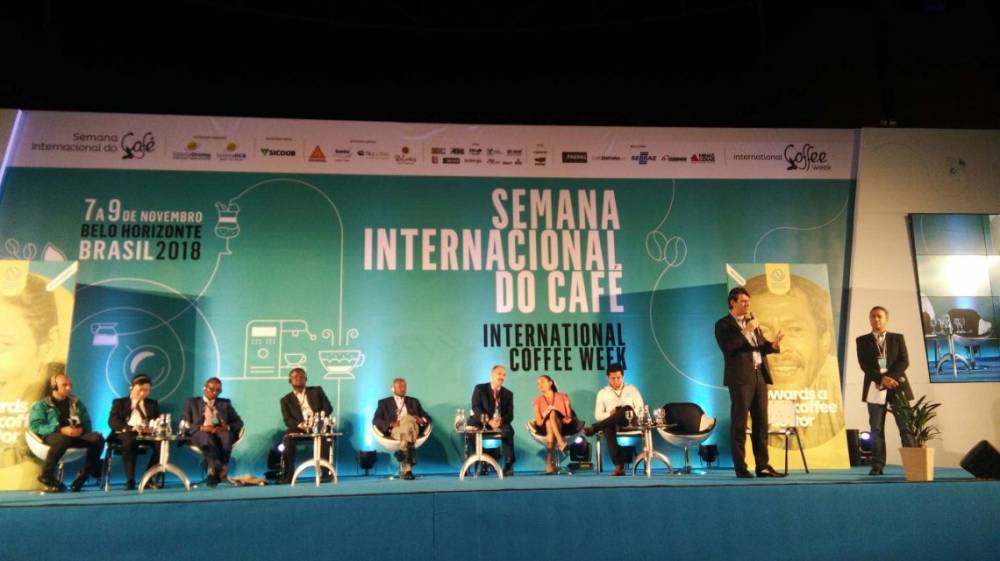GLOBAL COFFEE SUSTAINABILITY CONFERENCE
Belo Horizonte (Brazil), 8-10 November 2018 – Global Coffee Sustainability Conference (GCSC) is held annually by Global Coffee Platform as a coffee sustainability event. This year Belo Horizonte – Brazil from 8-10 November 2018 was selected as to host the event during the International Coffee Week, the event was participated by more than 200 stakeholders from NGO, donors, cooperative, private sectors, government representatives and representatives from ICO (International Coffee Organisation).
The event is also attended by 9 country platform from world’s main coffee producers namely Indonesia, Viet Nam, Uganda, Tanzania, Kenya, Honduras, Nicaragua, Colombia, Brazil.
SCOPI represents Indonesia sustainable coffee platform, the Chairman of Executive Board-Irvan Helmi and Executive Director-Veronica Herlina attended the event as the platform representatives, both focused on Indonesia efforts in increasing production and quality of Arabica and Robusta international forums. One of the ongoing efforts is the empowerment of farmers through intensive training on sustainable practices and post-harvest based on NSC (National Sustainable Curriculum).
At center stage, SCOPI presented few on-going sucessfull programs, one of the most prominent program is the NSC Arabica and Robusta dissemination through farmers mentoring by Master Trainers (MTs) who are involved intensively in master trainer program.
There are 184 activite Master Trainers (MTs) Arabica and Robusta up to October 2018 who are trained to mentor local farmers on spread in 15 provinces in Indonesia. They are coming from different background such as governments extenstion workers or known as PPL, argonomist experts, staffs from private sectors and non-profit organisation that are SCOPI members or partners.
SCOPI targets to achieve 25.000 farmers to be trained intensively by Master Trainers and are encouraged to join SCOPI’s mentoring program by year 2021. SCOPI also presented few programs where all stakeholders can comtribute and collaborate to optimise the effort in achieving sustanable coffee in Indonesia. Given the fact that Indonesia is the 4th largest coffee producer in the world and there are plenty of room for improvement and development hence the role of sustainable coffee in Indonesia has become extremely important.
On the 3rd day the focused of the event was on sharing and learning from each different country platforms where we can learn from others’experiences on the variety of coffee produced and how the achieved it.
In addition of presenting programs and achievements, all the country platforms were also given the opportunity to conduct field trip on 11-12 November.
Our first destination was Caxambu Farm (Três Pontas), a family-owned private estate that has been managed inheretely through generation more than 100 years ago. Although it is a family business and counted as a small estate by Brazil size with 20 staffs, this estate has well equipped processing facilities and organised system.
COOMAP was our last destination, a cooperative with a member of 800 farmers with total land area of 7,000 HA. The cooperative is very concered with farmers’ track record including soil analysis and almost all GAP (Good Agricultural Practices) and post-harvest processes are done with machines, they are no longer dependent on human labour. The cooperative developes a program to fullfil the needs of farming for the farmers to get their supplies.
The specific lessons learen from this field trip are:
- Traceability has been implemented by the average farmers in Brazil
- Technology helps to smooth the work
- Committed to the work, including mainiting the consistency of the quality of the product
- Utilising grass instead of protective trees to maintain the soil moisture
- Stems are not selected upon pruning but to cut all the brances from right to left using cutting machine
- Twice a year harvesting schedule, this will ensure the bi-yearly farmers’s income cycle
One of the most interesting presentation came from Viet Nam, the 2nd largest coffee producer. Through country platform established by Ministry of Agriculture and Rural Development, VCCB (Viet Nam Coffee Coordination Board) aims to influence policy, provide police recommendations to stakeholders, as a platform of information sharing, dialogue, and communication for coffee sector and represent Viet Nam in international forums. VCCB together with Global Coffee Platform and other stakeholdres through various means such as meeting, workshop, and site visit strive to develop important policies related to cofffee development fund, access to finance, developing coffee varieties, and water management. VCCB actively bridging cooperation between government and private sectors through different outlet and encourage active participation from its members.
We can see that government involvement is needed to support countries’ platform for sustainable coffee programs. Strong synergy on the active role of the government both in form of cooperation with private sectors and NGOs as well as funding has greatly hoisted Viet Nam to become fast developed coffee producer.
Other take aways we can learn as valuable lessons and may well be even an important step to done in Indonesia is the need to strengthen the involvement of various members and partners for the program to be impactful. Monitoring and evaluation is needed to measure the result of the implemented program, this will provide useful insight to determine the appropiate next steps, a thorough identification of problem and to specify the indicators which may varies from country to country. SCOPI needs to identify its priority area to provide the solution for the issues that are faced by stakeholders.
Further information on GCSC can be access through here

